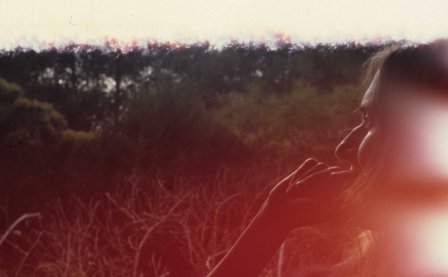Even as he handed over his flash drive with five-odd Josephine Foster projects to which he’d listened to obsessively, my roommate was surprised to hear she was American, having believed the Colorado native was “Spanish or European or something.” I can’t exactly blame him: borrowing alternately from Romantic classical, art-rock, and Appalachian folk and indulging in album-length adaptations of poetry by García Lorca and Emily Dickinson, Foster has sung variously in German and Spanish as well as in English. Her nebulous, nation-state-defying voice returns on Blood Rushing, a “story within a story” concept album that narrates the account of her author-insert Blushing.
Under stars, through the Great Divide of the Rocky Mountains and amid many forms of surging water, Foster-Blushing navigates a fertile world of birth and rebirth. For a musician who frequently works with the lyrics of others (the new record is her first collection of original material since 2008’s This Coming Gladness), Foster is a surprisingly competent and natural songwriter; freed from the constraints of tonal faithfulness owed to giants of poetry like Dickinson, Foster is able to draw from disparate genres to play with whatever form she’s interested in from song to song. That might mean aping Ennio Morricone for ode to the American West “Panorama Wide,” shaping a meandering lazy-river tranquility for ballads “The Wave of Love” and “Underwater Daughter,” or assaulting the listener with the sudden fuck-you psych of “Geyser.” It makes for a slightly unbalanced listen, but the variety is welcome after the relative stylistic uniformity of her last few releases.
Foster’s known for her collaborations with other musicians, whether she’s working with Jason Ajemian as Born Heller, the psychedelic backing band The Supposed, or her husband Victor Herrero, with whom she released a collection of Spanish folk songs earlier this year. Herrero is back on guitar for Blood Rushing, joined by A Hawk and a Hacksaw’s Heather Trost on violin, but it’s Foster’s singing that really stands out above the arrangements, above her own carnal lyrics and menstrual imagery, to constitute the heart of the album.
Much has been said of Foster’s failed aspirations to sing for the opera, which has left her the rare coloratura soprano who performs loamy, experimental folk music. But perhaps we should be thankful she couldn’t cut it with the lorgnette-clutching snoots in the high boxes of opera houses. And as difficult as it might normally be to place her voice regionally, the Josephine Foster of Blood Rushing embodies a wistful, washed-out Americana that’s right at home among the America-of-old’s fecund landscapes and pristine rivers, an America without pollution of light or noise or waterways, to make the statement, through Blushing, that this is who I am and this is where I’m from.
More about: Josephine Foster




